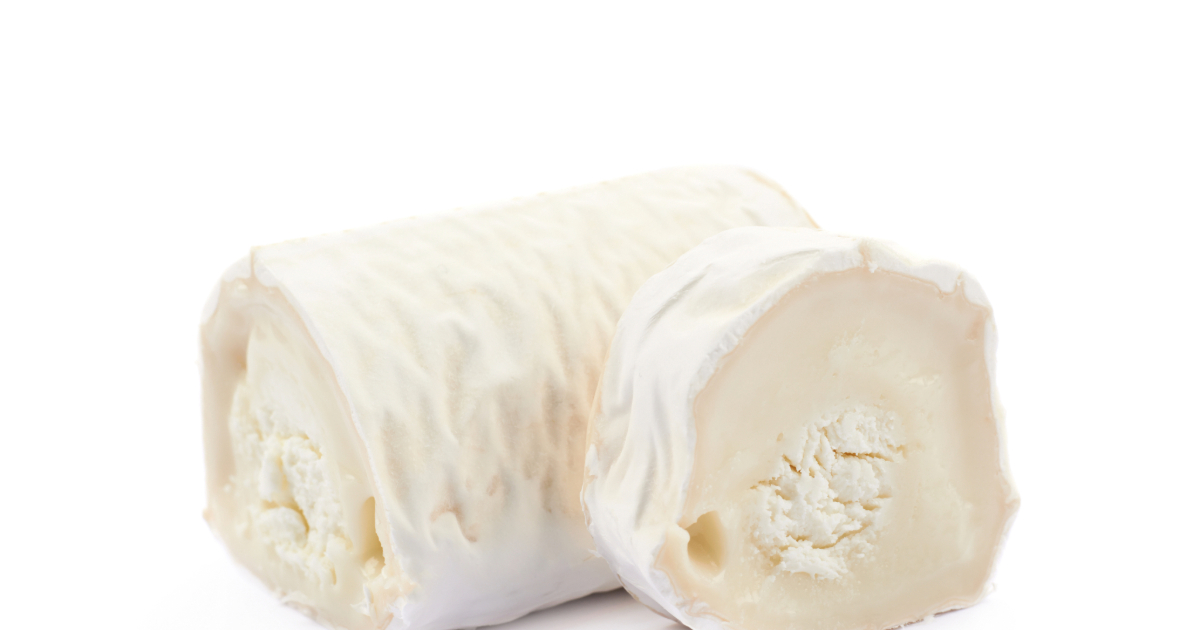Goat cheese and brie are both popular types of cheese, but they have some key differences when it comes to their nutrition and characteristics.

Nutritional Profile: Macros and Calories
First, let’s examine the macronutrients - protein, carbs, fat - and calories in goat cheese and brie. The values below are for 100g servings.
Goat Cheese
- Calories: 364
- Protein: 21.58g
- Carbs: 0.12g
- Fat: 29.84g
- Fiber: 0g
Brie
- Calories: 334
- Protein: 20.75g
- Carbs: 0.45g
- Fat: 27.68g
- Fiber: 0g
As you can see, goat cheese is higher in calories, protein, and fat compared to brie. However, brie contains slightly more carbs. Both cheeses are very low carb, with minimal fiber content.
Key Takeaway: Goat cheese is higher in calories and fat than brie, but very similar in other macros.
Vitamin Content
Now let’s examine some key vitamins found in goat cheese and brie.
Vitamin A
- Goat Cheese: 1464 IU per 100g
- Brie: 592 IU per 100g
Vitamin B12
- Goat Cheese: 0.22mcg per 100g
- Brie: 1.65mcg per 100g
Vitamin K
- Goat Cheese: 2.5mcg per 100g
- Brie: 2.3mcg per 100g
The data shows that goat cheese contains over twice as much Vitamin A compared to brie. However, brie provides significantly higher Vitamin B12. The two cheeses are fairly equal in Vitamin K content.
In general, goat cheese tends to be higher in B vitamins like riboflavin, while brie excels in Vitamin B12.
Mineral Content
Here is how the two cheeses compare for some key dietary minerals:
Calcium
- Goat Cheese: 298mg per 100g
- Brie: 184mg per 100g
Phosphorus
- Goat Cheese: 375mg per 100g
- Brie: 188mg per 100g
Sodium
- Goat Cheese: 415mg per 100g
- Brie: 629mg per 100g
Selenium
- Goat Cheese: 3.8mcg per 100g
- Brie: 14.5mcg per 100g
As shown above, goat cheese contains substantially higher amounts of calcium and phosphorus compared to brie. However, brie is lower in sodium. Brie also provides nearly 4 times as much selenium as goat cheese.
In addition, goat cheese tends to be higher in minerals like iron and magnesium compared to brie.
Key Takeaway: Goat cheese is an excellent source of calcium and beats brie in many minerals, but brie contains more selenium.
Health Benefits
Both goat cheese and brie offer some valuable health benefits:
Goat Cheese Health Benefits
- High in calcium to support bone health
- Good source of B vitamins for energy
- Contains probiotics that aid digestion
- Anti-inflammatory effects that may reduce disease risk
Brie Health Benefits
- Contains antioxidants that fight cell damage
- Provides protein to build muscle and repair tissues
- Excellent source of Vitamin B12 for red blood cells and nerves
- Probiotics may improve gut and immune health
So while they overlap in some areas, each cheese also has some unique advantages. Goat cheese is superior for bone health thanks to its extremely high calcium levels. Brie offers more vitamin B12, which plays a vital role in nerve functioning.
Taste and Texture
There are also some clear differences when it comes to taste and texture:
Goat Cheese
- Tangy, tart flavor
- Smooth, creamy texture
- White color
- Can range from spreadable to crumbly
Brie
- Rich, buttery flavor
- Soft, almost runny texture when ripe
- Ivory color
- Edible rind with mushroom-like flavors
So goat cheese tends to be tangier and firmer, while brie is known for its silky texture and more robust flavor profile. The rind on brie contributes added depth and complexity.
Cost Comparison
On average, goat cheese costs around $15-20 per pound in the US, while a typical brie costs $8-15 per pound. However, artisan varieties of either cheese can be pricier. Since goat cheese requires extra labor and care to produce, it usually carries a higher retail price tag compared to brie.
Storage and Serving Tips
Storing Goat Cheese
- Wrap tightly in parchment paper or plastic wrap
- Lasts 1-2 weeks refrigerated
- Avoid freezing as it changes texture
Storing Brie
- Loosely wrap wheel in parchment paper
- Lasts for several weeks refrigerated
- Can freeze for up to 6 months
When serving either cheese, allow it to come to room temperature first to bring out the fullest flavors. Pair goat cheese with bread, fruit, honey, or nuts. Enjoy brie with cured meats, fruit, baguette, jams, or wine.
Best Uses in Cooking & Recipes
Thanks to its tangy flavor and smooth texture, goat cheese works nicely in:
- Salads
- Omelets
- Pizza
- Pasta
- Dips and spreads
- Cheesecake
The creamy richness of brie makes it ideal for:
- Baked brie dishes
- Grilled cheese sandwiches
- Flatbreads
- French onion soup
- Savory tarts
- Cheese plates
With a little creativity, both cheeses can be used to add flavor, creaminess, and visual appeal to both sweet and savory recipes.
FAQs
Which cheese is healthier, goat or brie?
Goat cheese is a good choice thanks to probiotics, calcium, and B vitamins. But brie also offers health perks through its high vitamin B12, antioxidants, and probiotics. Ultimately, they can both be part of a balanced diet.
Why is goat cheese more expensive than brie?
Producing goat cheese requires additional effort and resources like housing the animals, milking by hand, pasteurizing milk, etc. This makes it pricier to create than the larger-scale production of cow's milk brie.
Can people sensitive to cow milk eat goat cheese and brie?
Some people with a cow milk allergy can actually tolerate goat cheese. But brie should still be avoided since it's made from cow milk. Always check with your doctor if you have food sensitivities.
How long does goat cheese last compared to brie?
Properly stored goat cheese lasts around 1-2 weeks refrigerated. An intact wheel of brie keeps for several weeks under refrigeration. So goat cheese tends to have a shorter shelf life compared to brie.
What wine pairs best with goat cheese vs brie?
Tangy, crisp white wines like Sauvignon Blanc complement goat cheese nicely. Brie pairs well with whites like Chardonnay or sweeter wines such as Riesling. Sparkling wines can also make a nice accompaniment to either cheese.
Conclusion
While goat cheese and brie share some nutritional qualities and both make nice additions to recipes, they differ considerably in areas like calories, texture, flavor, and more.
Goat cheese dominates when it comes to mineral content and probiotics.
Brie offers its own advantages for vitamins and antioxidants.

